HDFS 3
1/95
There's no tags or description
Looks like no tags are added yet.
Name | Mastery | Learn | Test | Matching | Spaced | Call with Kai |
|---|
No analytics yet
Send a link to your students to track their progress
96 Terms
5 functions of a supportive family
Families help children
Provide basic material necessities
Encourage learning
Help them develop self-respect
Nurture friendships
Foster harmony and stability
what helps some children thrive in a difficult family or neighborhood conditions
Resilience - involves capacity to adapt well in the face of significant adversity and to overcome serious stress
what characterizes popular vs neglected children at this time
Popular children
Kind, trustworthy, cooperative
By end of middle childhood, status more important and popular children become more aggressive to others
Unpopular children in US
Neglected
Aggressive-rejected
Withdrawn-rejected
stopping a bully
Successful bullying prevention programs
Whole school must be involved, not just the identified bullies
Intervention is more effective in the earlier grades
Bystander intervention
Evaluation of results is critical
Important to help bully too, usually have underlying problems that cause the bullying
KiVA International
OLWEAUS
helping children through divorce
Parents should marry, but commitments need to be made carefully to minimize the risk of divorce
If divorce occurs, adults need to minimize transitions and maintain a child's relationships with both parents
when does puberty start? how does it work? when does the brain know to tell the body?
Puberty is the time between the first on rush of hormones and full adult physical development. It usually lasts three to five years and requires many more years to achieve psychosocial maturity
For boys it occurs between ages 9 and 18 and for girls it occurs between ages 8 and 18.
Puberty is a period of rapid physical maturation involving hormonal and bodily changes in early adolescence.
why are adolescent girls experiencing earlier age of menarche
There is an increase of processed foods and people are eating more than they used to
Also may be due to increased stress
are there differences in psychosocial adjustment for teens that mature earlier vs later than average
Early maturing girls tend to have lower self esteem and more depression in a poor body image
May be attracted to older boyfriends
Early maturing boys are more aggressive in alcohol abusing
Slow developing boys tend to be more anxious depressed
what are the key aspects of adolescent brain development? when does it stop? what is the last structure to develop?
The usual sequence of brain maturation, propelled by hormones that activate the limbic system at puberty, can lead to danger
It is important for a steady maturation of the prefrontal cortex
Positive aspects of adolescent brain development can include increased myelination, enhanced dopamine and super learners
why do adolescents stay up later than younger children? how much sleep do they need
Adolescents need to get between 8:00 and 10:00 hours of sleep per night
As a result of puberty, circadian rhythm shift forward during adolescence, promoting a change in melatonin secretion
For example 7:00 in the morning for adolescence is like 4:00 AM for the rest of us
when is sexual activity risky vs healthy?
risky when the risk of sexually transmitted infections is high.
Healthy at the right age and with appropriate protection
what are some common problems with cognition during adolescence?
imaginary audience
involves thinking intensely about themselves and about what other people think of them
what are some common problems with cognition during adolescence?
rumination
to think obsessively about something perhaps to the point that a past experience or current fantasy captures the mind making further action difficult
what are some common problems with cognition during adolescence?
personal fable
characterized by an adolescence belief that their thoughts feelings or experiences are unique, more wonderful or awful than anyone else's
what are some common problems with cognition during adolescence?
invincibility fable
gocentric conviction that they cannot be overcome or even harmed by anything that might defeat a normal mortal, such as unprotected sex drug abuse or high speed driving
what are some major changes in cognitive development in adolescence according to Piaget?
Formal operational thought - characterized by more systematic logic and the ability to think about abstract ideas
Hypothetical thought - includes reasoning that uses propositions and possibilities that may not reflect reality, transforms perceptions
what are some problems with tests?
Many have complained that exit tests force teachers to prepare students to be good test takers who knew facts, rather than teaching them to work with others, analyze problems, synthesize facts, identify fake news, imagine new solutions
how can we help promote a growth mindset in adolescence?
When adolescents are better able to think abstractly, analytically, hypothetically, and logically, They can respond to the usual pedagogy of high school
Students with this mindset seek challenges
Teachers and students with fixed mindset attribute low performance to personality, community, family, or intelligence
Instead we should ask - what problems do you want to solve?
what are the 4 key factors to consider when evaluating peer influences in adolescence?
peer pressure
involves encouragement to conform to one's friends in behavior, dress, attitude
what are the 4 key factors to consider when evaluating peer influences in adolescence?
selection
selecting friends whose values and interests they share
what are the 4 key factors to consider when evaluating peer influences in adolescence?
facilitation
peers facilitate both destructive and constructive behaviors in one another
what are the 4 key factors to consider when evaluating peer influences in adolescence?
deviancy training
destructive peer support in which one person shows another how to rebel against authority or social norms
what distinguishes adolescence and young adulthood, the crises they face, according to Erikson?
Adolescence - identity vs role confusion - 5th stage of development, person tries to figure out "who am I" but is confused as to which of many possible roles to adopt
Identity achievement - attainment of identity
Emerging adulthood - intimacy vs isolation - emphasizes that humans are social creature, intimacy progresses from attraction to close connection to ongoing commitment, social isolation is harmful
Romantic partners - passion, intimacy, commitment
what adolescent drug prevention/intervention programs have been shown to work? Not to work?
Antidrug curricula - may increase drug use
Massive ad campaigns sometimes worked
DARE - does not work
Success - Communities that Care, Personality-targeted interventions
What is emerging adulthood? Does everyone experience it?
Between ages of 18 and 25/29, which is now widely thought of as a separate development stage
Millions of young people now linger before entering full adulthood
5 features of this period: Instability, identity exploration, self focus, feeling in between, possibilities.
Worldwide trend
organ reserve
capacity of organs to allow the body to cope with stress, via extra unused functioning ability. Harder for older bodies to adapt to stress
homeostasis
adjustment of all the body systems to keep physiological functions in the state of equilibrium
allostatsis
dynamic body adjustment that affects overall physiology. Homeostasis requires an immediate response from the body system, whereas allostasis refers to longer term adjustment
interaction of organ reserve
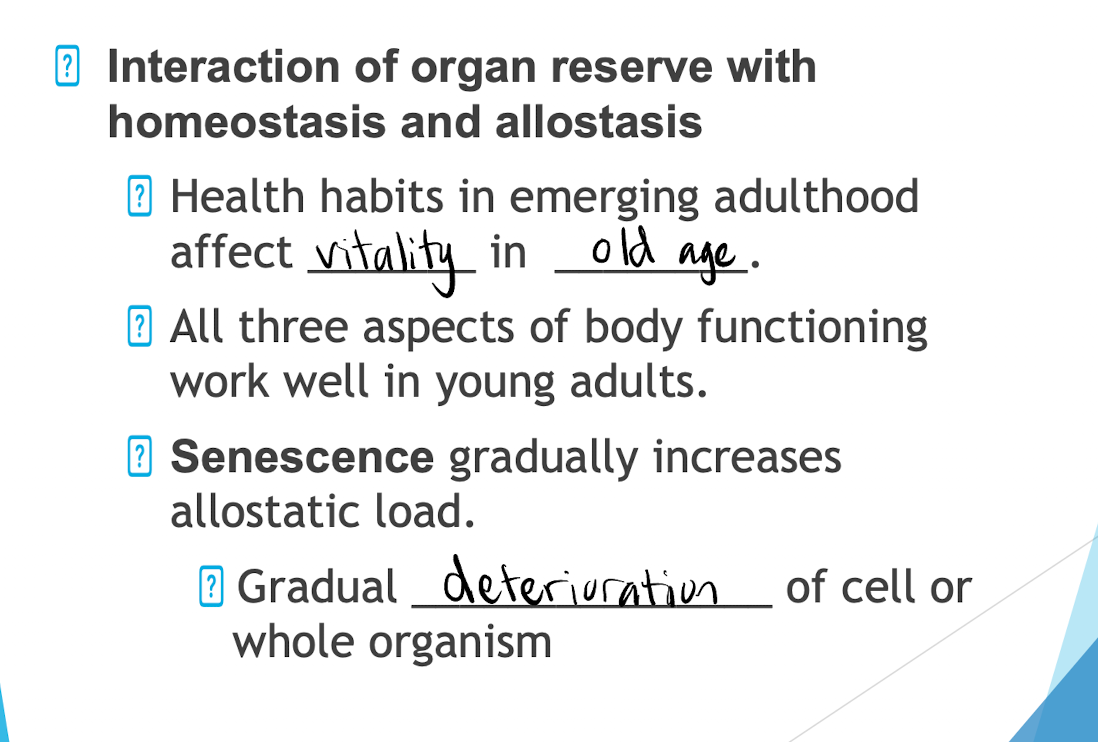
is adolescence or emerging adulthood a time for increased risk of psychopathology
Emerging adulthood is an increased time for psychopathology
how common is a substance use and substance use disorder among emerging adults
Substance use disorder - ingestion of a drug to the extent that it impairs users biological, psychological, or social well-being
Determining factor is potential for harm
More common for those in emerging adulthood
Maybe due to the increase in anxiety and depression?
is there evidence for a 5th stage in Piaget’s theory, called postformal thought?
proposed fifth stage of cognitive development
Extends adolescent thinking by being more practical, flexible, and creative. Characterized by the use of formal analysis
Occurrence as a person is less impulsive and reactive and more practical and imaginative
This stage is controversial
in what ways are emerging adults showing advanced cognitive ability compared to adolescents?
Cognitive flexibility - characteristic that is more common in emerging adults than in younger people
Helps people deal with unforeseen events, involves listening to others and considering diverse opinions
what is dialectical thought?
every idea of truth bears within itself the opposite idea of truth
Thesis, antithesis, synthesis
what is a stereotype threat? research supporting it?
the possibility that one's appearance or behavior will be misread to confirm another's oversimplified, prejudiced attitudes, self-imposed
General prejudice, racial or ethnic prejudice
Mere possibility of being negatively stereotyped brings anxiety
what is the difference between emerging and established adulthood?
Established adulthood occurs around ages 30 to 35
Progressing careers, romantic relationship, childcare
what happens to blood pressure with age?
increases with age
Hypertension and consequences like heart disease
what suggests that the aging process is not dependent solely on time and genes?
occurs in everyone and in every body part, but the rate of decline is highly variable within and between persons due to environmental influences
when does a person show age?
Age starts to show around age 30 when skin becomes thinner and age 40 with age spots
" middle age spread" - appears, muscles weaken, body changes by age 50
which of the senses declines before 65?
Vision changes occur before age 65 and hearing changes
what impairs fertility in men and women?
In males - advanced age, fever, radiation, prescription drugs, stress, drugs, alcohol, cigarettes
In females - anything that impairs physical functioning - advanced age, diseases, smoking, extreme dieting, obesity, pelvic inflammatory disease
effects of menopause?
Production of estrogen, progesterone and testosterone drops considerably
Cytological consequences
deaths of despair
Alcohol related liver disease, opioid overdose, suicide
what is intelligence?
Some believe to be smarter than others because of their higher intelligence level creating lifelong impact
IQ scores gathered for children are generally predictive of education, income
what is g?
General intelligence - involves all cognitive abilities, which people possess in varying amounts, cannot be measured directly but inferred from various abilities
fluid intelligence
mental capacity to learn or invent new strategies for efficiently solving problems
decreases with age and crystallized increases
crystallized intelligence
knowledge acquired through experience
analytical intelligence
valuable in high school and college, as students are expected to analyze various ideas
Creative intelligence
allows people to find a better match to their skills, values and desires
practical intelligence
useful as people age and need to manage their daily lives
Most adults need practical intelligence
how does intelligence change in adulthood?
Value of each kind of intelligence depends partly on age and partly on culture
Analytic - valued in high school and college
Creative - valued when new challenges arise
Practical - value during adulthood
what is selective optimization with compensation theory?
Adults select certain aspects of intelligence to optimize and neglect the rest
Multitasking is an example of selective optimization and becomes more difficult with age
multitasking
harder with age
What are the three need of adults, according to Erikson?
Identity, intimacy, integrity
What do all people strive for, according to Maslow?
All people strive to have their needs met
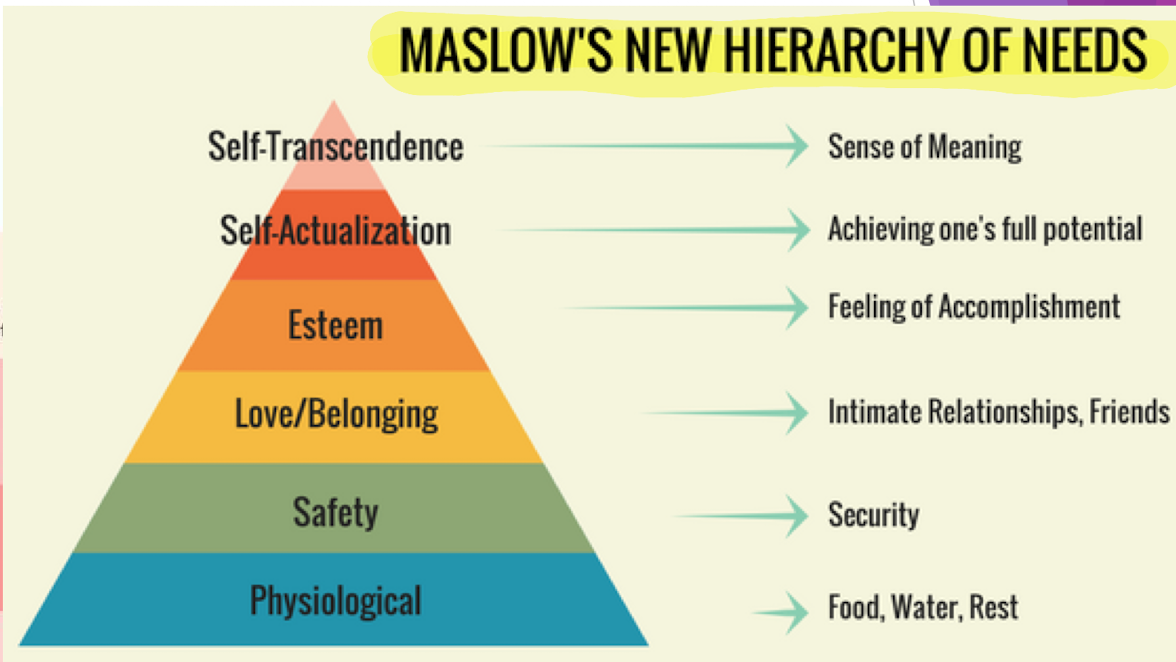
What are the big 5 traits?
Social viability decreases with age, social dominance and agreeableness and conscientiousness and emotional stability and openness to experience increase with age
General age trend is positive, less neuroticism, greater conscientiousness, more agreeableness
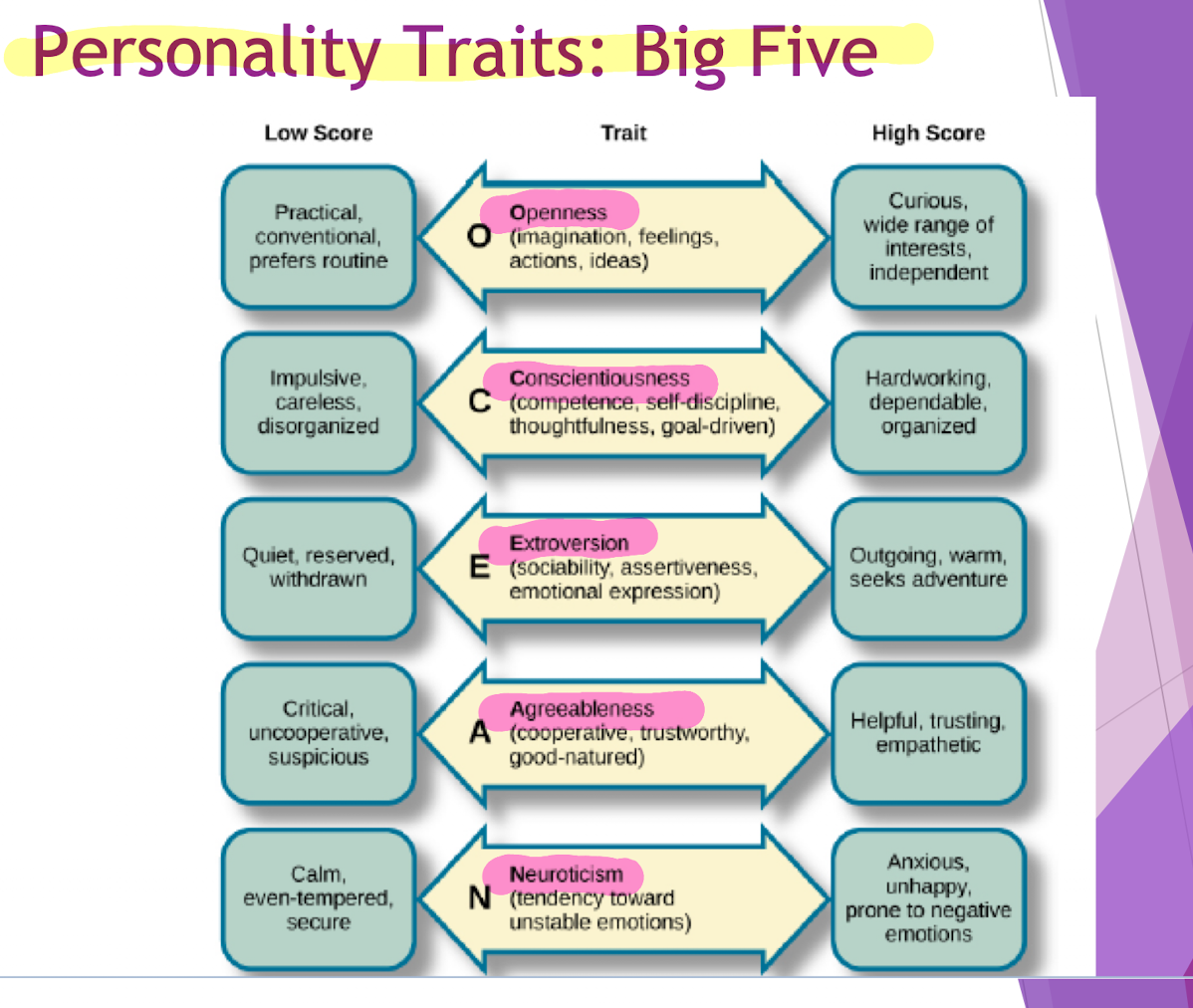
What are the big 5 traits?
openness
imagination, feelings, actions, ideas
What are the big 5 traits?
conscientiousness
competence, self-discipline, thoughtfulness, goal driven
What are the big 5 traits?
extroversion
sociability, assertiveness, emotional expression
What are the big 5 traits?
agreeableness
cooperative, trustworthy, good-natured
What are the big 5 traits?
neuroticism
tendency towards unstable emotions
what needs to do long-term partners meet?
Link to lifelong health and happiness, Co habituation rates are increasing for all ages
why do people need a social convoy?
Collectively, the family members, friends, acquaintances and even strangers move through the years of life with the person
Help with support and emotional needs
why is it a mistake to call middle-aged adults the “sandwich generation?
Have to help their kids and their parents, may reflect it is bad but many enjoy being needed
hows does Piaget’s theory of how cognition changes in adolescence correspond to the major structural changes in the adolescent brain development?
duel processing and the brain
limbic system activated by puberty, pre-frontal cortex matures more gradually
cortical regions involving impulse control continue to develop through early adulthood
the adolescent brain gives fewer signals of caution/inhibition than the adult brain
subcortical regions involving sensation seeking develop rapidly after puberty
intuitive thought
thought that arises from an emotion or a hunch, beyond rational explanation, influenced by past experiences and cultural assumptions
analytical thought
thought that results from analysis, systematic ranking of pros and cons, risks and consequences, possibilities and facts
depends on logic and rationality
prevalence of suicidal thoughts among high school students
42% - persistent sadness and hopelessness
16% - suicide plan
9% - attempt suicide
how common is alcohol and drug use among emerging adults?
most common at this age
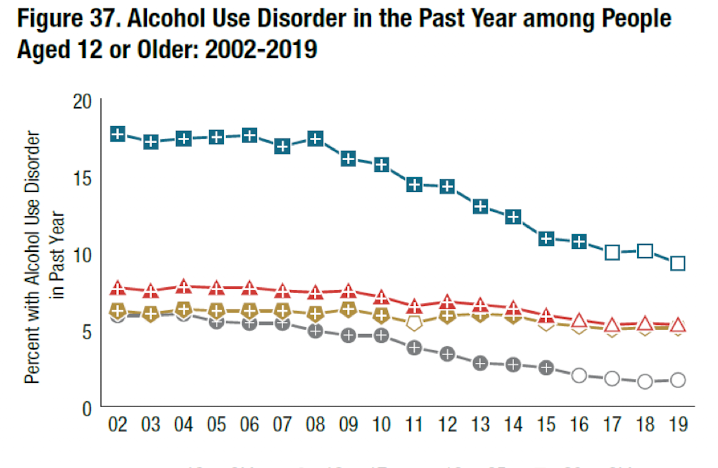
Substance use disorder (SUD)
ingestion of a drug to the extent that it impairs user’s biological, psychological or social well-being
determining factor is potential for harm, not dose or specific substance
infertility
involves being unable to conceive after trying for at least a year
12% of couples are infertile
peak fertility
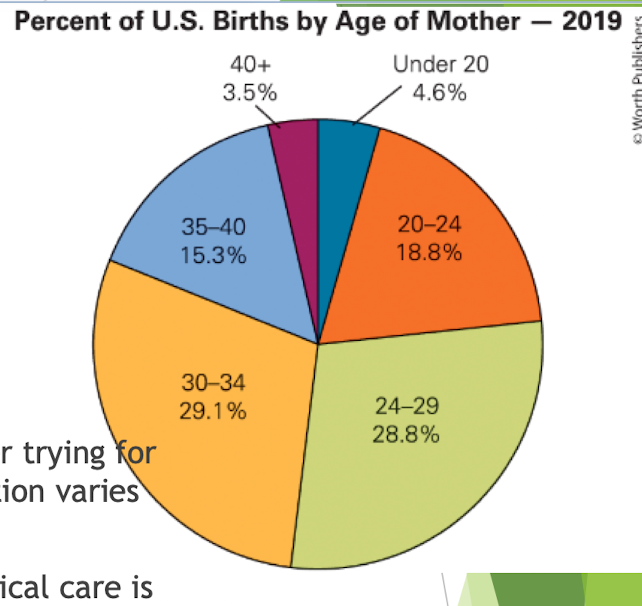
exercise helps every condition at every age
protects against serious illness: protects mental and physical health
maintains flexibility and strength
intensity not necessary, regular exercise is
prevelence of obesisty in US
2/3 of adults are overweight
1/3 age 25-65 obese
6% obese
suicide risk
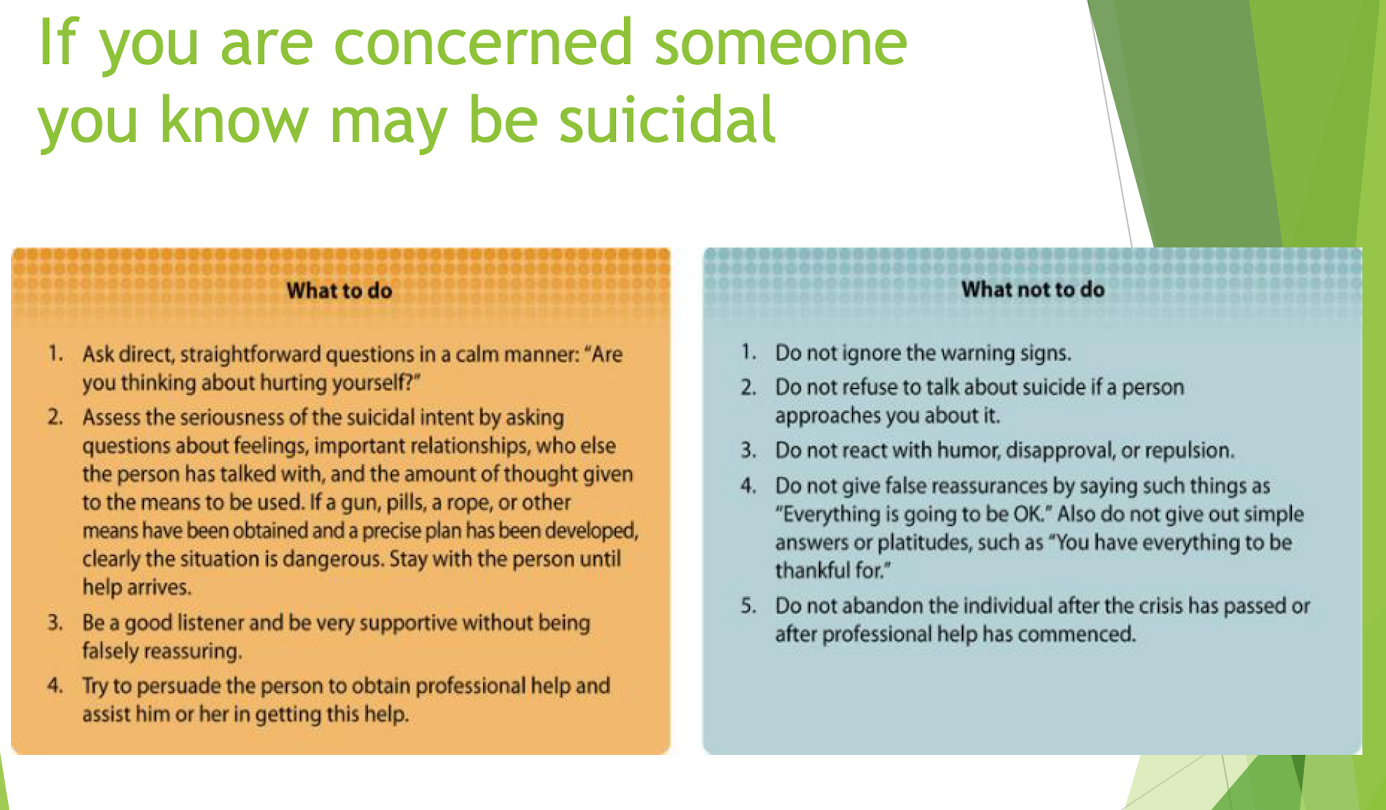
mortality
average life expectancy in 2021 is 76.4 years
morbidity
compared to men, women have lower rates of mortality but higher rates of morbidity
disability
physical disabilites are often measured by inablity to preform the activites of daily life (ADLs)
vitality
some psychologists call it happiness, satisfaction, flow, flourishing
stages of adulthood
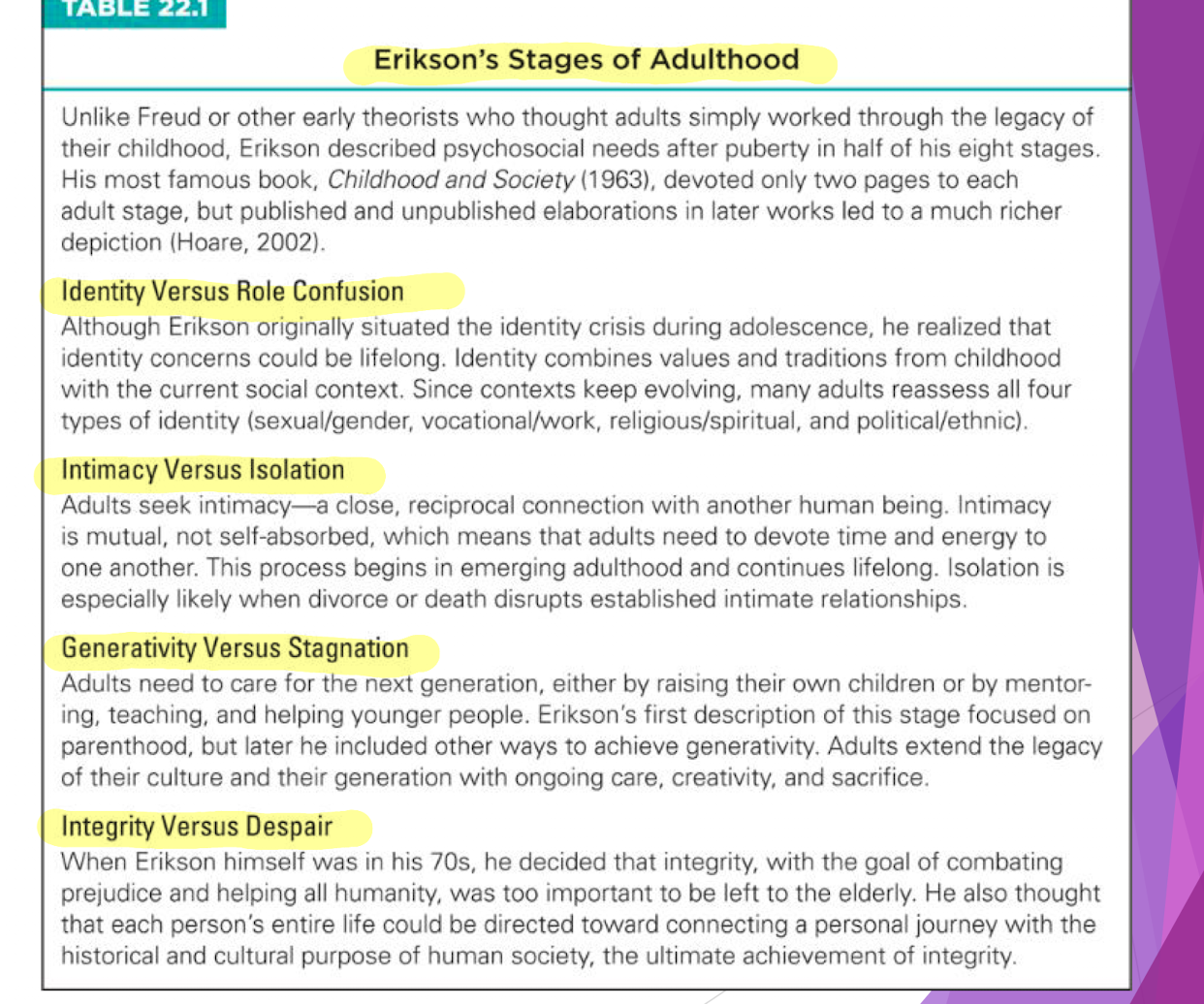
personality change in adulthood
strength of every trait is affected by maturation
general age trend is positive, less neuroticism , great consciousness and agreeableness
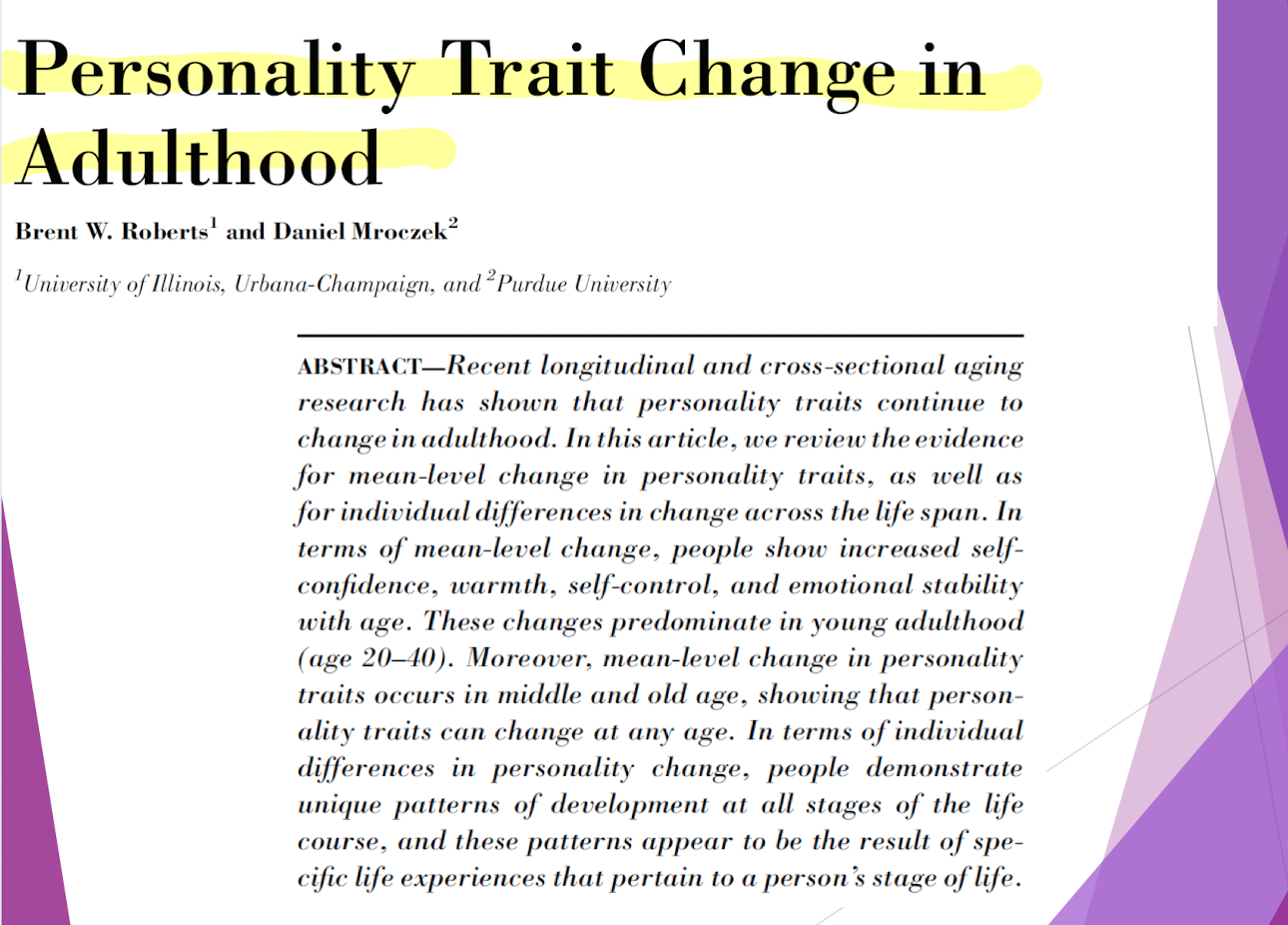
toxins
environmental toxins in childhood disrupt the “maturation” of personality traits in adulthood
empty nest syndrome
perhaps an outdated concept, most married folks report increases in marital satisfaction after children leave the home.
If married folks were primarily staying together because of their children, then maybe it’s more relevant
are we more or less sexually active than in the fast
we are less sexually active
the biological activity that begin puberty involve a hormonal signal from
hypothalamus
pituataryy glad
how many adolecents in HS have seriously considered suicide
20%
drug use before the age of 18 indicates
predicts later drug use problems
The most common substance use disorder is ________; it is estimated that ________ of emerging adults are affected
alcohol use disorder, 10-20%
What age is peak fertility
age 20
WEIRD
Western, educated, industrialized, rich democracies
senescense
when you dont notice yourself aging
For women, taking progesterone and estrogene is linked to ______ risk of cancer, heart disease
greater
healthy in moderation
1-2 drinks per day
generativity
productive in caring and unselfish ways
primary form of generativity
established and guiding younger generation
marital satisfaction begins to decline
after first 6 months